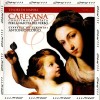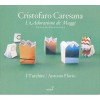Composers
Cristofaro or Cristoforo Caresana (ca. 1640–1709) was an Italian Baroque composer, organist and tenor. He was an early representative of the Neapolitan operatic school.
Born in Venice, his precise birthday is not known. After studying under Pietro Andrea Ziani (uncle of Marc'Antonio Ziani) in Venice, he moved to Naples late in his teens, where he joined the theatre company of Febi Armonici which produced early examples of melodrama. Later, in 1667, he became an organist and singer in the Chapel Royal and director of the Neapolitan Conservatorio di Sant'Onofrio a Porta Capuana, one of the famed orphanage-music schools of Naples, until 1690. In 1699 he succeeded Francesco Provenzale as Master of the Treasury of San Gennaro. He wrote music for a number of other Neapolitan institutions until his death in Naples in 1709. Amongst others, the Spanish guitarist and composer Gaspar Sanz studied music theory under his tutelage.
He is remembered for his cantatas, especially for the nativity season as well as instrumental interludes sometimes featuring spatially separated ensembles. His music continues to be played and recorded to the present day and stands as a testament to the quality of this Neapolitan baroque composer.
Recently Added
Biography
Cristofaro or Cristoforo Caresana (ca. 1640–1709) was an Italian Baroque composer, organist and tenor. He was an early representative of the Neapolitan operatic school.
Born in Venice, his precise birthday is not known. After studying under Pietro Andrea Ziani (uncle of Marc'Antonio Ziani) in Venice, he moved to Naples late in his teens, where he joined the theatre company of Febi Armonici which produced early examples of melodrama. Later, in 1667, he became an organist and singer in the Chapel Royal and director of the Neapolitan Conservatorio di Sant'Onofrio a Porta Capuana, one of the famed orphanage-music schools of Naples, until 1690. In 1699 he succeeded Francesco Provenzale as Master of the Treasury of San Gennaro. He wrote music for a number of other Neapolitan institutions until his death in Naples in 1709. Amongst others, the Spanish guitarist and composer Gaspar Sanz studied music theory under his tutelage.
He is remembered for his cantatas, especially for the nativity season as well as instrumental interludes sometimes featuring spatially separated ensembles. His music continues to be played and recorded to the present day and stands as a testament to the quality of this Neapolitan baroque composer.






![Provenzale – Dialogo, Vespro - Florio [CD 2 of 2]](http://static.classicalm.com/repository/collection-cover/small/1374-img1374167597705107.jpg)